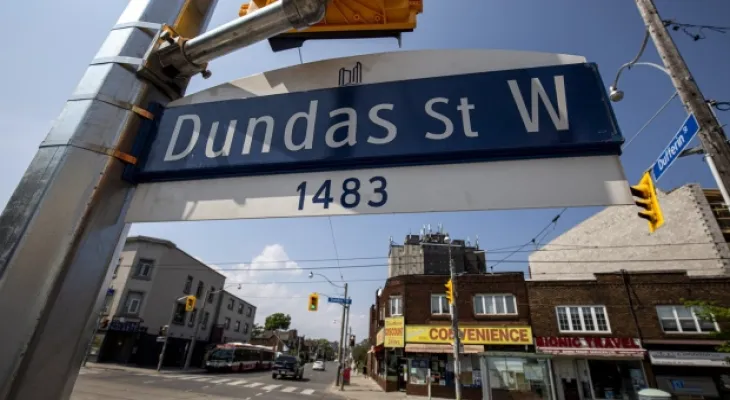Search here
Newspaper
Search here

Arab Canada News
News

Published: August 15, 2023
Some people see renaming Dundas Street in Toronto as a necessary step to confront the city's history, which was partially built by individuals connected to the transatlantic slave trade of the British Empire.
Meanwhile, others believe that the estimated cost of about $8.6 million to rename the 23-kilometer road is wasted spending for a city facing a financial crisis, including a looming budget deficit estimated at around $1.5 billion.
It seems that the renaming will move forward after Toronto's new mayor, Olivia Chow, expressed her support for the project earlier this month, with her spokesperson Cherwin Razvani endorsing it as a "response to community desires."
However, while answering questions from reporters on Monday, Ontario's Finance Minister, Peter Bethlenfalvy, appeared to question the wisdom of this decision. When asked whether the province would provide Toronto with more funds to cover the budget shortfall, Bethlenfalvy said, "We've gone there for Toronto, we've put billions of dollars to support Toronto... and I'll just ask the mayor to consider some things like renaming Dundas Street." "Is this the priority you want to fund? And if they have the money to do that, that's the council's will. So, that's something I'll leave to the mayor, and I'm sure we'll sit down at some point."
Dundas Street, which runs east to west through the southern end of Toronto, is named after Henry Dundas, the first Viscount Melville, a politician active from the 1770s to the early 19th century when the British Parliament was discussing proposals for the abolition of slavery. There is disagreement over Dundas's role in the expansion of the slave trade.
Melanie Newton, co-chair of the city council advisory committee considering the renaming issue and who studied Dundas's legacy, stated that while Britain was weighing abolition, "Dundas intervened and proposed a 'gradual abolition'."
She said in an interview, "He was supported by slave owners and slave traders... who knew that the death penalty would eventually be abolished."
Newton added that Dundas’s proposal aimed to "safeguard slavery without the slave trade in the long term," and that the ongoing debate gave slave owners time to smuggle more Black people, especially young people of reproductive age, to maintain the enslaved population.
Bobby Dundas, a descendant of Dundas, the tenth Viscount Melville, argued against this on social media and informed British media that Dundas was actually an advocate for abolition and was trying to be strategic with the "gradual abolition" movement.
Newton said her research and the work of other historians discovered otherwise, adding, "Some may believe this is an abolitionist stance, but it's largely about securing the future of slavery in the long term without human trafficking," noting that the case supporting the renaming of the street is clear.
Newton, who is also a history professor at the University of Toronto, continued, "We live in a democratic society, but we're traversing streets that silently celebrate white supremacy with their names; it is fundamentally undemocratic not to consider renaming or reevaluating these kinds of names... If we also acknowledge that slavery and colonial genocide have ongoing legacies and we know they do."
She added that the cost of renaming Dundas Street is a small part of Toronto's operating budget, which is approximately $16.17 billion.
The City of Toronto's statement on this issue acknowledges the debate over Dundas's "motivations," but concludes that "the consequences of delaying the abolition of the slave trade are clear; whether Dundas is viewed with scorn or as pragmatic, his actions and the actions of the British government he served contributed to the entrenchment of human slavery."
It states that the renaming of the street is moving forward, despite "significant budget pressures due to the failure of provincial and federal governments to provide the expected COVID funding."
Before the expected renaming, a 20-member committee composed of residents, neighborhood advisors, and business owners was tasked with inviting "historians and community leaders specializing in Black and Indigenous history and culture" to suggest new names.
The advisory committee chose to focus on names that celebrate the stories of Black Torontonians.
For Andrew Loutchehed, a PhD candidate studying street names and historical sites at Metropolitan University of Toronto, renaming Dundas Street ultimately would be an achievement.
Loutchehed launched the Toronto debate over Dundas Street by submitting a petition in 2020. After thousands of signatures, he caught the attention of then-mayor John Tory, who supported the proposal.
In a telephone interview, Loutchehed said the idea for the petition came to him after learning that protesters were pressing for the removal of the statue of Henry Dundas in Edinburgh, Scotland during global anti-racism protests sparked by the death of George Floyd in 2020 at the hands of police in Minneapolis.
He said, "I thought to myself, if Edinburgh is having this conversation, it's really important that we have that conversation here in Toronto because Edinburgh is talking about a statue that's 152 feet tall, but we have a monument that is over 23 kilometers long here in Toronto; to put that in perspective, that's like a statue that's nearly 200 Great Pyramids tall."
Newton and Loutchehed noted that Dundas Street was a road originally created by Indigenous peoples living near the ports of Lake Ontario.
Loutchehed added, "So the name doesn’t just commemorate the colonizer, the road itself also represents the colonization of Indigenous knowledge, emphasizing that renaming the street is an 'important first step in signaling, on behalf of our city government, that they are willing to tackle these issues directly, and they are ready not only to dedicate time and effort, but also to devote funds to address these concerns.'
Comments